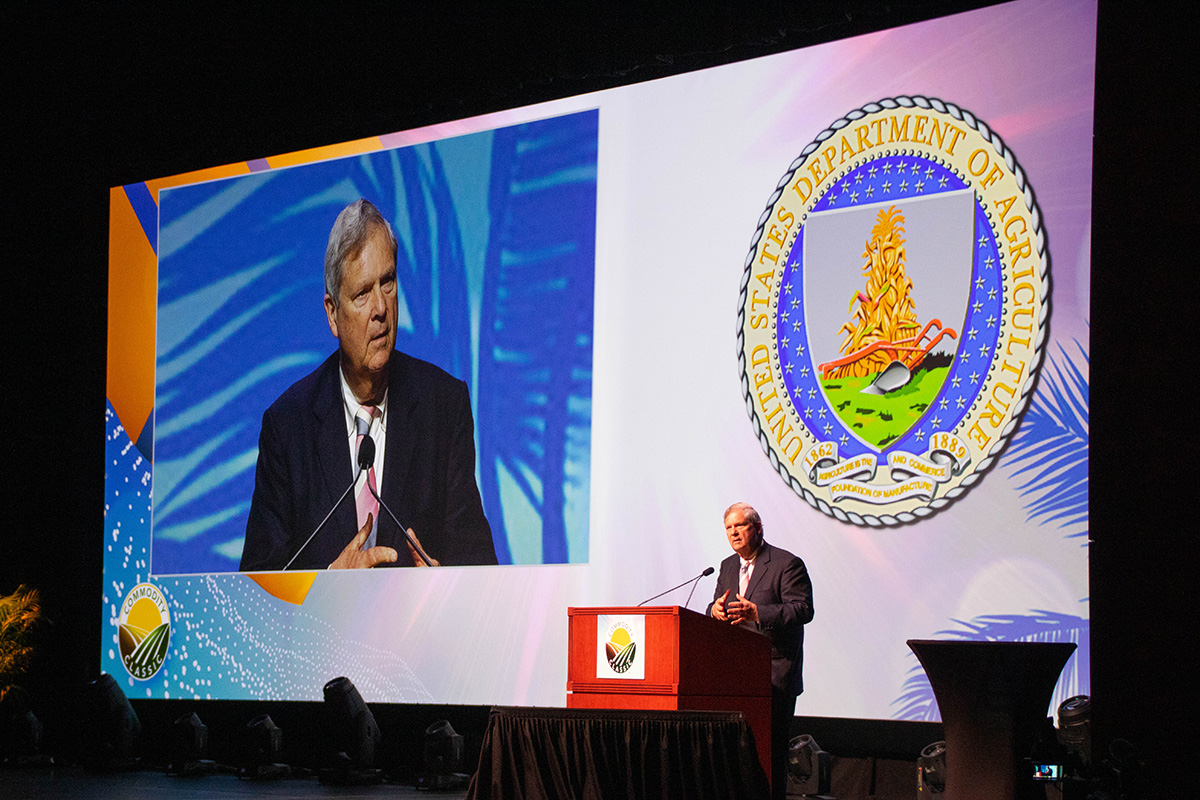
(Photo: Devin Benish/Iowa Soybean Association)
Vilsack touts ‘now’ as transformational moment for U.S. ag in annual Commodity Classic Address
March 10, 2023 | Aaron Putze, APR
A transformational moment is here for U.S. agriculture declared U.S. Secretary of Agriculture Tom Vilsack to a packed auditorium of soybean, corn, sorghum and wheat farmers gathered for Commodity Classic in Orlando.
No longer must farm families rely solely on the sale of crops and livestock and farm program payments for income.
Instead, the former Iowa governor and Mt. Pleasant mayor touted an assortment of new opportunities for adding value and profit to the farming enterprise – from tapping eco-system services markets to expanding the production and use of bio-based products.
“We’ve always talked about trade, input costs and competition, and rightly so,” said Vilsack. “Yet there’s more to do, and that involves creating additional income streams and market opportunities for producers.”
To prime the pump, the USDA made $1 billion available to the ag industry for creating voluntary, incentive-based projects to enhance environmental outcomes that have robust monitoring, measuring, and reporting systems.
More than 1,000 applications were submitted for Partnerships for Climate-Smart Commodities grants involving every commodity produced in the U.S.
Beginning last fall, the USDA announced 141 projects selected for funding. They touch every state in the union, cover 25 million acres and will involve an anticipated 60,000 farmers.

“It’s about helping famers move beyond relying solely on commodity sales and farm program payments,” Vilsack said. “We’re want farmers to benefit from additional business ventures to provide income not necessarily directed to the marketing of specific commodities. The climate smart commodities grant project does that.”
Near the top of the list was the awarding of a $95 million grant to the Iowa Soybean Association (ISA) for the creation of the Midwest Climate-Smart Commodity Project project.
Administered by the Soil & Water Outcomes Fund, the five-year project will provide direct financial incentives for farmers operating in Iowa and 11 additional states to implement on-farm practices resulting in positive environmental outcomes.
USDA funds will be leveraged with $62.1 million in corporate commitments for outcome-based payments to farmers—supporting conservation practices on millions of farmland acres in 12 states.
Vilsack called out ISA and Iowa soybean farmers, saying the project will accelerate public and private partnerships necessary to achieve sustained improvements in air and water quality while adding value to every acre and commodity enrolled.
“ISA’s unique and innovative approach embodies the spirit and intent of USDA’s desire to expand income opportunities for more farmers in more places while reinforcing the notion farmers are stewards of the land and water,” he said.
In a grant signing immediately following his general session remarks, Vilsack admitted that ISA’s leadership “was a matter of personal pride,” given his Iowa roots.
“The Iowa Soybean Association has always been at the forefront of new and creative ways to farm,” he said.
“I appreciate the great work that’s been done, and the unique partnership formed by this project,” Vilsack added. “It’s everything we envisioned when establishing the project because it not only focuses on producers but involves those who also get the advantage of utilizing products grown on the farm.”
In addition to innovative climate-smart grant projects, the nation’s top ag official said USDA remains committed to lowering input costs and maintaining competition and global markets for U.S. commodities.
Examples cited included grants incentivizing domestic fertilizer production, increasing animal ag processing, ensuring timely patent development and approvals for seed and ensuring agricultural trade agreements are science- and rules-based.
While access to markets, competition and cost-competitive inputs have been shining examples of USDA’s commitment to farmers, Vilsack reiterated more innovative approaches will be needed to keep farmers on the land while welcoming future generations to a livelihood that puts food in grocery stores and maintains America’s national security.
“The genesis of eco-systems markets is a pivotal and transformational moment,” Vilsack said. “It complements trade and expands entrepreneurial opportunities. It allows us to continue to build family farms and transfer farms to new generations.
“It is right here. It is right now,” he added. “And with a farm bill conversation coming up, we must ensure these opportunities remain viable and have the opportunity to expand. Let’s create a farm bill that benefits many and the most.”
Putze serves as Sr. Director of Information & Education. He can be reached at aputze@iasoybeans.com.
Back